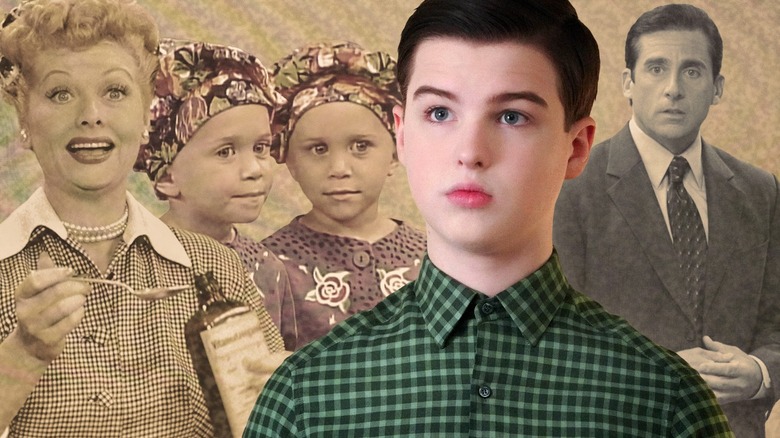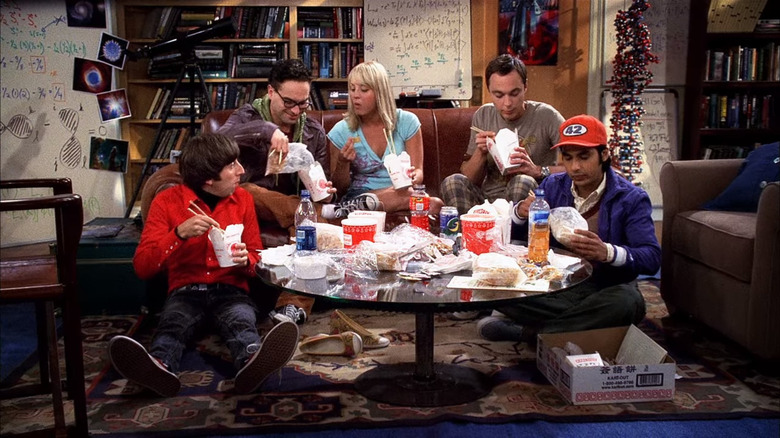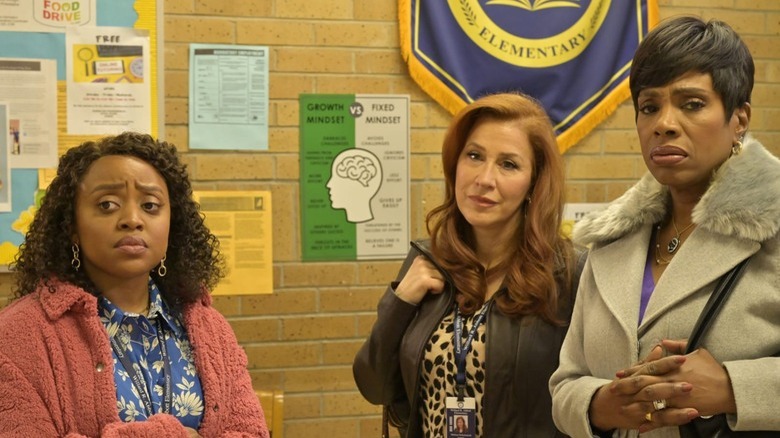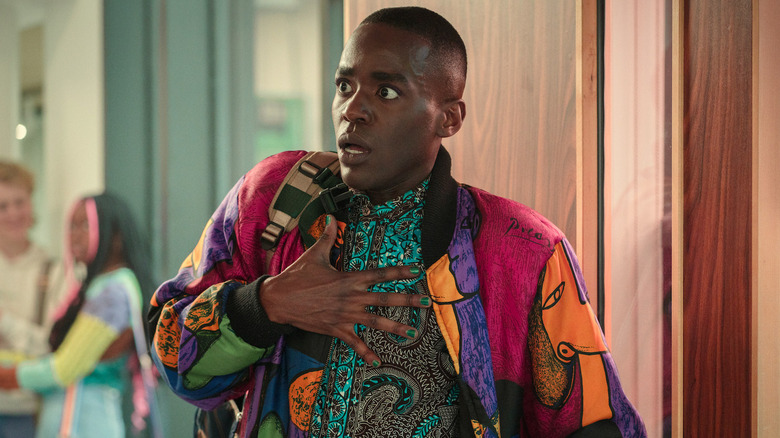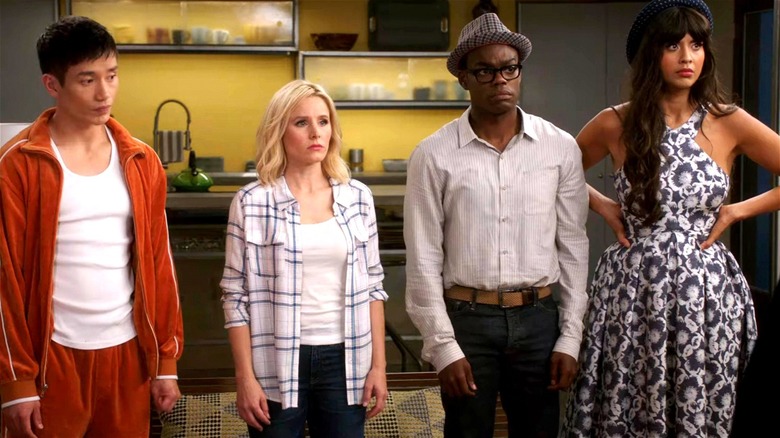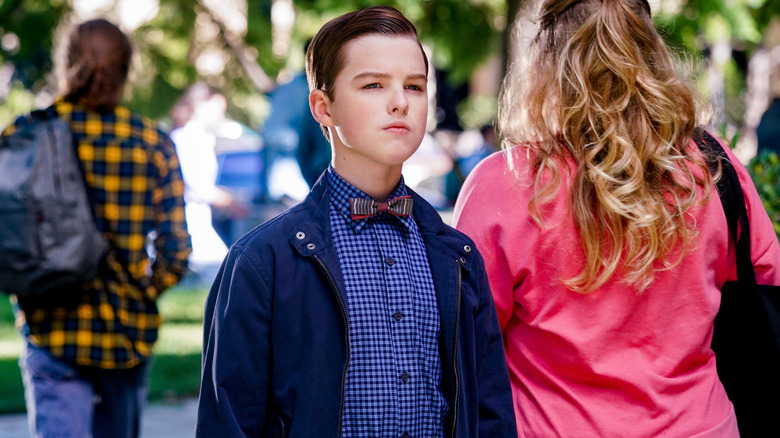Young Sheldon Needs To Be The End Of Sitcoms As We Know Them
Picture this: in late 2016, three years before "The Big Bang Theory" came to an end, Chuck Lorre and Steven Molaro pitched a ground-breaking, earth-shattering idea to CBS executives. The idea? "What if Sheldon Cooper, but young?" From that simple premise, "Young Sheldon," the prequel series based on the character played by Jim Parsons on "The Big Bang Theory," was born.
Officially greenlit in March of 2017, "Young Sheldon" casts Iain Armitage as, well, a young Sheldon, exploring his childhood as he desperately tries to fit in with his less intelligent peers. On the one hand, this makes sense. "The Big Bang Theory" is one of the biggest and most popular sitcoms of the modern era. People love Sheldon, and it makes sense that they'd want to see what he was like as a kid. "Young Sheldon," unlike its predecessor, dispenses with the laugh track, positioning itself as a more evolved take on the sitcom.
But when push comes to shove, "Young Sheldon" is just another super-traditional sitcom, and it's the last of its kind — hopefully. Because once it leaves the air, another traditional sitcom like this can't possibly seize the same level of pop culture notoriety. That era, for better or worse, is over.
A seventh season is in the works for "Young Sheldon," and fans have long speculated that — based on "TBBT" canon — it will be the last. Whether or not "Young Sheldon" should end right away is beside the point, though. "Young Sheldon" is the last survivor of a different sitcom era, and when it concludes, society has already made it clear that the new era of sitcoms will see formulas broken apart and remolded with more dramatic storylines, bolder takes, and themes that resonate deeply with real-world issues.
Young Sheldon is just the legacy of TBBT carrying on, and tomorrow's sitcoms need new ideas
2023 took an interesting turn when it came to sequels, prequels, or works based on existing intellectual property. Sure, "Barbie" is based on a doll — technically — but writer-director Greta Gerwig worked alongside her co-writer Noah Baumbach and her star Margot Robbie to make it interesting, quirky, and new. Superhero sequels like "Ant-Man and the Wasp: Quantumania" underperformed at the box office compared to their predecessors.
So, what does any of this have to do with "Young Sheldon?" Yes, the show still attracts audiences, but there are a lot of people out there looking for something different. "Young Sheldon" never had a chance at being original, considering that it's based on "The Big Bang Theory." It's the same character everyone knows, but — and we cannot stress this enough — young. However, in the years after "The Big Bang Theory" debuted, sitcoms started taking bigger and bigger swings, ditching traditional laugh tracks and getting more creative with their framework — even before that, "How I Met Your Mother" toyed with its timeline and narrative despite keeping the laugh track (unlike "Young Sheldon," that show's spin-off "How I Met Your Father," which started airing in 2022, made the totally bizarre choice to keep the laugh track).
Sitcoms have to try really novel concepts at this point. They've become too predictable, too safe. And something as traditional as "Young Sheldon" just isn't up to the task.
The heyday of meta sitcoms like The Office and Modern Family is over
We saw sitcoms evolve into a new form not that recently. Remember the meta era? For a long time, every single sitcom was structured around some sort of fictional documentary.
Starting with the American remake of "The Office" spearheaded by Greg Daniels, mockumentary shows like "Modern Family" and "Parks and Recreation" took off in a huge way in the late 2000s. By now, the format has run out of steam. "The Office" made the weird decision to actually bring the documentary crew into the narrative at the end of the show, and "Parks and Recreation" simply never addressed the documentary format at all. Michael Schur, who created the latter alongside Daniels, crafted some of the era's more inventive sitcoms like "Brooklyn Nine-Nine" and "The Good Place," abandoned this format as he continued on with his work, and shows like "New Girl" and "Community" (though the latter was very meta in its own way) relied on strong ensembles and focused less on the show's general premise. For a while, like laugh tracks, the mockumentary seemed to be a thing of the past.
There is, to be fair, one major sitcom still using a mockumentary format, and that's "Abbott Elementary." Even so, that's the kind of show ushering sitcoms into a bright new future. So how does that shake out?
Well, first of all, the mockumentary format works perfectly for "Abbott," which presents itself as a documentary about underfunded schools in the United States. Second of all, creator and star Quinta Brunson understands one big thing audiences want from sitcoms these days — and that's authenticity and a more dramatic look at real-world topics.
Audiences want sitcoms to have grit & authenticity now, not the safety of Young Sheldon
Let's return to "Parks and Recreation" for just one second. Not unlike "Abbott Elementary," the show is set in a small, underfunded workplace where people are trying to create a better world. "Parks and Rec," though, presents an idyllic utopian world where small government can actually solve problems. Quinta Brunson grew up within the famously poorly funded Philadelphia public school system, and the world she presents in "Abbott" is charming, funny, gritty, and real.
In the very first episode, after a kid in her class ruins the rug and she can't afford to replace it, Brunson's Janine gets help from her colleague Melissa (Lisa Ann Walter), a real South Philly gal who just so happens to have a "rug guy" that can grab her a new one for free. Several plotlines on the series revolve around funding for the elementary school or the teachers fighting against the possibility of the public school becoming a charter school, which are very real problems that teachers at schools like these face.
After the start of the 2020s, which have been marked by more unprecedented world events than we'd care to list here, audiences don't necessarily want to engage with pure escapism anymore. "Abbott Elementary" — which famously donated a portion of its marketing budget to real Philadelphia schools that need money — lets you laugh while also reminding you that stuff needs to get better. "Young Sheldon" doesn't engage with anything in this way, and neither do sitcoms like it — which is why you're hearing less and less about them now, compared to the 1990s sitcom heyday where shows like "Seinfeld" and "Friends" fueled pop culture at large.
Netflix's Sex Education offers the sort of bold new step that post-Sheldon sitcoms need to take
It might seem strange to consider Netflix's boundary-pushing teen comedy "Sex Education" as a sitcom, but it definitely fits the description of a "situational comedy" — while really, really pushing the envelope. Centered around teenager Otis Milburn (Asa Butterfield), the show is set primarily at Moordale Secondary School, where Otis — the son of sex therapist Jean Milburn (Gillian Anderson) — ends up running a sex advice clinic out of one of the property's run-down bathrooms. Despite overarching themes across its four seasons, a lot of the show's epsiodes are structured almost around a "case of the week," not unlike a procedural, with Otis trying to help out his classmates trying to figure out their sexuality.
"Sex Education" is a daring, funny, and utterly bold show that represents teenagers and adults of all identities, sexualities, and classes, whether it's Eric Effiong (Ncuti Gatwa) grappling with coming out to his community, or the privileged Otis chasing Maeve Wiley (Emma Mackey), the brilliant but poverty-stricken girl of his dreams. Despite its unconventional approach to the entire genre, "Sex Education" is indisputably a sitcom, and it's a huge leap for the overall genre. Without a laugh track or the restraint required for traditional network sitcoms, "Sex Education" is able to elevate the idea of what a sitcom could look like ... though other shows have broken the mold within those restraints as well.
The Good Place is also a perfect example of a re-engineered sitcom
"Sex Education" definitely has more freedom thanks to its home on Netflix, but when "The Good Place" premiered on NBC in the fall of 2016, it also managed to push the limits of what a sitcom can be.
We can definitely spoil the Season 1 twist at this point — which is that Eleanor Shellstrop (Kristen Bell) and her friends think that they're in the "good" part of the afterlife but are actually in the "bad place" — but the show doesn't settle down once that's out of the way. From there, Eleanor and her friends discover that the architects of the bad place have been manipulating the system for years, resulting in a situation where every single decision one makes as a human being is so fraught that going to the bad place is a simple inevitability.
Creator Mike Schur and his talented core cast — Bell, William Jackson Harper, Jameela Jamil, Manny Jacinto, D'Arcy Carden, and the legendary Ted Danson — manage to wring laughs and pathos out of the show's four seasons in equal measure, and while other sitcoms might have taken a saccharine approach to the subject, "The Good Place" always manages to feel real and heartfelt. A show about Hell is definitely a big swing for something like a sitcom — a genre dominated by concepts like "what if a bunch of buddies hung out all the time and got into some real hijinks?" — but the show proved that the genre still has more evolutions ahead of it. And that brings us back to what happens once "Young Sheldon" ends.
So where do sitcoms go from here, once Young Sheldon ends?
Shows like "The Good Place," "Sex Education," and "Abbott Elementary" prove beyond any shadow of a doubt that sitcoms still have life in them yet. What isn't going to work going forward, though, is something as simplistic as "Young Sheldon."
Again, it makes perfect sense that CBS threw all their eggs into this Sheldon Cooper-shaped basket after the success of "The Big Bang Theory," but IP isn't enough anymore, as proven by the box office results of 2023. Throughout the year, moviegoers proved that they don't really want to watch "The Flash" or another "Ant-Man" movie just because it had a DC or Marvel label – instead, they wanted more creative comic book fare like "Spider-Man: Across the Spider-Verse." They flocked to "Barbie," a truly weird and spectacularly successful take on the world's most ubiquitous doll. "Oppenheimer," a historical biopic directed by Christopher Nolan — a director who's never met a big swing he didn't want to kiss and marry — smashed box office expectations despite being three hours long.
"Abbott Elementary" has racked up Emmys and Golden Globes across just two seasons. "Sex Education" and "The Good Place" have both ended, but both left a mark on the sitcom genre before closing out their narratives. Sitcoms need to be more creative than "what if this popular character was a kid," and based on the creative output we've seen in the genre, they will be. So, please, television executives ... don't offer the world "Young Michael Scott" and expect people to like it.
